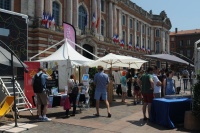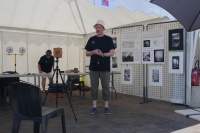ESOF 2018

On the 8-15th July 2018, in Toulouse, Aleksandra Kapuścińska-Bernatek and Roman Luboradzki took part in the EuroScience Open Forum (ESOF) organized by EuroScience. This conference brings together over 4 000 researchers, educators, business actors, policy makers and journalists from all over the world to discuss breakthroughs in science. More than 40% of the participants are students and young researchers. In addition to the lectures and the poster session, the ESOF also included events such as exhibitions, Face to Face Meetings to speed up partnerships, and Careers Speed meetings.
Aleksandra and Roman presented a poster entitled 'An experiment - a powerful tool in science popularization (use it wisely)' describing their experience in popularizing science. They have described activities such as Open Day lectures [part of the CREATE project], Research Workshops and Internships, and Student Internships, as well as 'The Sparks at the Interface of Sciences - University of Young Explorers', an educational project for primary school students.
In addition, Aleksandra and Roman took part in ‘Science in the City’ festival during which they presented experiments related to optics and camera obscura. Their show entitled 'Pinhole in the City' took place on the 14th of July. Posters and information about the shows have been translated into French to be more easily understood by the general public. The festival, the general public event of the ESOF forum, with more than 120 events in Toulouse and its surroundings, has been held from 7 to 15 July.
The participation in this forum was an excellent opportunity to promote the CREATE project and establish international cooperation with the representatives from other research institutions whose dissemination of science is one of the tasks.
Abstract
Experiments, with no doubts, are one of the most efficient and effective way to explain science and make it attractive to the people. However, while experiments illustrating basic education are easy to conduct, those explaining recent research results are somewhat more problematic. One can easily imagine chemical or physical experiments illustrating basic laws like chemical equilibrium or gravity lows, but what about the Higgs boson? Cicero described five factors that are decisive in communication. They are: the sender, the reciver, the medium, the topic and the language. Nowadays, the experiment should be added as a sixth element.
Our mission is to support children and teenagers from Poland in order to enable them to fully develop their talents and scientific passions.
More information about the event .



